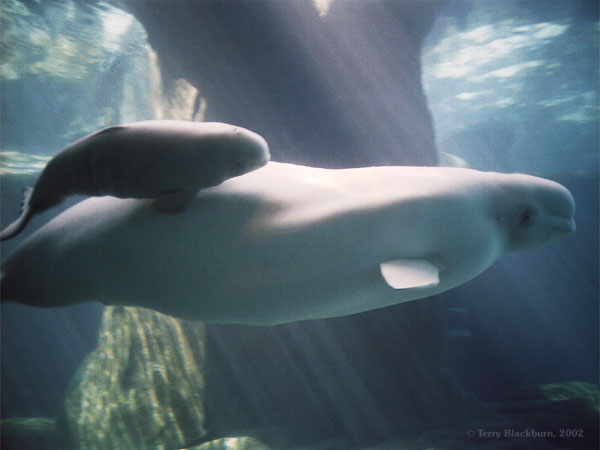Baby
Beluga in the Deep Blue Sea...
There are many interesting facts about the beluga's
reproduction. The basics are that the male and females
undergo sexual reproduction once they have reached maturity.
For females, maturity is obtained between 4-7 years, but for
males, maturity occurs between 6-9 years old. Then, during
the spring or early summer they will breed in small bays and may mate with
many different
partners. Gestation lasts 12-14 months and once
born the female will not mate for 2 - 4 years afterwards.
The calves are always born singly and have no interaction
with the fathers.
The interactions during
birth are quite fascinating. When the female is in labor
many other female belugas come and act as "midwives" to help
during the birth. The calf can be born either tail or head
first. Once the 4 foot calf is born, the "midwives" may help
the young beluga to the surface for it's first breaths. Then
the calf must get milk from the mother to get the fat and
nutrients from it. The beluga's milk is
green and is made up of 25% fat to help the calf form blubber to
stay warm in the Arctic waters. An interesting fact to know
is that baby belugas are not born white. They are born a
grey-blue and
lighten as they get older, which is one way to distinguish
age. The other ways of distinguishing age are, calculating
with the curve of their fins, and the rings of Beluga's
teeth are much like tree rings. Each year the beluga creates
two small growth rings that allow age distinguishing as
well. Generally, the average lifespan is around 40 years.
The bond between a mother and her
calf is easily the strongest tie within the beluga's lives.
Mothers that have lost their calves for some reason or
another, have been seen carrying buoys and other floating
objects to act as their lost calf.
--Notice how the calf is a grey and the mother is white.

Picture Permission By :
Blackburn, T. 2002. Vancouver/Victoria B.C. (online).
|